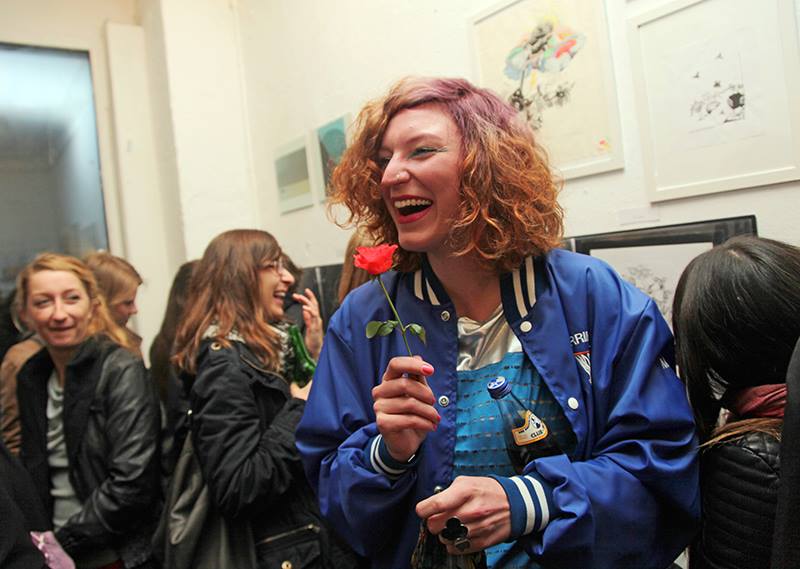Who’s Laughing Now: The Question Of Art School

For two days this past weekend, the losers took the stage. In a small storefront gallery in Neukölln, seven artists gathered to show work rejected by Berlin art schools, shining a spotlight on those artists who have gone unsupported by the academy and calling into question the value of an art education. After all, times have changed—right? Artists are no longer supported by wealthy families (unless they are lucky enough to come from one) and apprenticeships have gone the way of the typewriter (for better or worse).
So what’s an erstwhile young artist to do in order to secure himself a place in the modern art market? More and more the answer seems to be “go to art school;” and yet, every artist I talk to, whether or not they attended, seems to have significant qualms about the merit of an art education. So in the support of the losers, in pursuit of the truth, today we ask: is art school really worth it?
Learning And Teaching
From 1999 to 2009, the average cost of attending college has risen 29% in the United States and tuition has been on the rise across Europe as the financial crisis has deepened. These days, a BFA can run you upwards of 150,00 dollars, and an MFA will set you back close to 60,000—if you’re lucky enough to attend one of the more prestigious institutions. And yet, there is no guarantee of income for artists after graduation—nowhere to go for good jobs with healthcare and benefits, except back into the system from which they sprung.
According to professor and consummate professional artist John Baldessari, “Young MFAs today have never seen bad times, so the financial crisis is coming as a big shock to them. I’m getting more and more letters from ex-students asking me to write letters of recommendation so they can get teaching jobs.”
Like the snake who swallows it’s own tail, the art education system is a beast that feeds upon itself—getting fat off the high fees paid by starry-eyed young artists who then graduate deeply in debt and find themselves queuing up for the only jobs available to them: jobs in art education. The art education system will slowly starve without the students hungry for a career in the arts upon which it feeds—does this mark the enterprise as inherently evil? Probably not.
Winning And Losing
Personally, I regard my time at art school as a trip not unlike Dorothy’s over-the-rainbow hop to Oz: a learning experience populated by a strange host of unconventional characters that ended with a chilling return to exactly where I had been before. Did I enjoy art school? Absolutely—what’s not to love about spending eight hours a day in your studio surrounded by professional artists and students devoted to improving your practice in one way or another. Was it worth it? I’m really not sure.
How do you measure the merits of devotion to an artistic practice, connections with your fellow emerging artists, established professionals, and a certain measure of institutional accreditation against crushing debt, the lack of marketable skills acquired, and the standardization of artistic practices, conferred over the course of an art degree?
Perhaps the answer is in the outcome: are artists who attend art school more likely to “make it” in the arts? (The ostensible goal of many, if not most, young creatives considering their options.) To my knowledge, there is no quantitative data that will answer the question once and for all; but if you look at the creme de la creme of the contemporary art market, you’ll see just as many artists who never earned a degree (Dash Snow, Ryan McGinley, Reineke Dykstra) as stars seasoned by school (Liz Magic Laser, Terence Koh, Lola Schanbel).
The current Venice Biennale has been singled out for the unprecedented number of “outsider artists” selected for participation, reflecting the growing integration of alternative practices into the mainstream art market. As graffiti artists, like Banksy, Buff Dis and Blu, regularly work their way into the upper echelons of the art world without a BFA, and social scientists like Trevor Paglan represent a newfound interest in artists with scholarly backgrounds in alternative fields, the evidence begins to weigh in against the art school alternative.
Yet, as I wandered around the well-curated “This is for Losers” show this past Sunday, I couldn’t help but feel let down by the overall quality of the work. The drawings, photographs and collage on display by the unselected artists were amateurish—and yet there was a measure of passion in the work; a palpable love of the work. Leonard Cohen has described his time at graduate school as “passion without flesh, love without climax:” so maybe the real question is not whether or not you want to start, but rather how you want to finish.
Article by Hannah Nelson-Teutsch
Be the first to write a comment.
Your feedback



